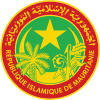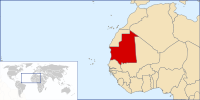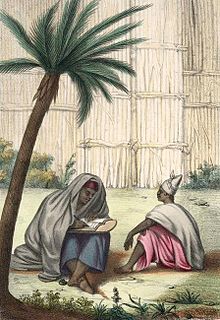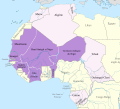Portal:Mauritania
The Mauritania Portal - بوابة موريتانيا
Mauritania, officially the Islamic Republic of Mauritania (Arabic: الجمهورية الإسلامية الموريتانية, al-Jumhūrīyah al-Islāmīyah al-Mūrītānīyah), is a sovereign country in Northwest Africa. It is bordered by the Atlantic Ocean to the west, Western Sahara to the north and northwest, Algeria to the northeast, Mali to the east and southeast, and Senegal to the southwest. By land area Mauritania is the 11th-largest country in Africa and 28th-largest in the world; 90% of its territory is in the Sahara. Most of its population of some 4.3 million lives in the temperate south of the country, with roughly a third concentrated in the capital and largest city, Nouakchott, on the Atlantic coast. The country's name derives from the ancient Berber kingdom of Mauretania in North Africa within the ancient Maghreb. Berbers occupied what is now Mauritania beginning in the third century AD. Arabs under the Umayyad Caliphate conquered the area in the late seventh century, bringing Islam, Arab culture, and the Arabic language. In the early 20th century, Mauritania was colonized by France as part of French West Africa. It achieved independence in 1960, but has since experienced recurrent coups and periods of military dictatorship. The most recent coup, in 2008, was led by General Mohamed Ould Abdel Aziz, who won subsequent presidential elections in 2009 and 2014. He was succeeded by Mohamed Ould Ghazouani following the 2019 elections, which were considered Mauritania's first peaceful transition of power since independence. Mauritania is culturally and politically part of the Arab world; it is a member of the Arab League and Arabic is the official language. The official religion is Islam, and almost all inhabitants are Sunni Muslims. Despite its prevailing Arab identity, Mauritanian society is multiethnic; the Bidhan, or so-called "white moors", make up 30% of the population, while the Haratin, or so-called "black moors", comprise 40%. Both groups reflect a fusion of Arab-Berber ethnicity, language, and culture. The remaining 30% of the population comprises various sub-Saharan ethnic groups. Despite an abundance of natural resources, including iron ore and petroleum, Mauritania remains poor; its economy is based primarily on agriculture, livestock, and fishing. Mauritania is generally seen as having a poor human rights record, and is particularly censured for the perpetuation of slavery as an institution within Mauritanian society, with an estimation by the 2018 Global Slavery Index of about 90,000 slaves in the country (or 2.1% of the population). (Full article...) Selected article -The Toucouleur people or Tukulor people (Arabic: توكولور, French: Toucouleur), also called Haalpulaar (Ajami: هَالْݒُلَارْ, Adlam: 𞤖𞤢𞥄𞤤𞤨𞤵𞤤𞤢𞥄𞤪), are a West African ethnic group native to the Futa Toro region of Senegal. There are smaller communities in Mali and Mauritania. The Toucouleur were Islamized in the 11th century; their early and strong Islamic heritage, which is seen as a defining feature, is a "matter of great pride for them". They were among the first Muslims in the area that became Senegal. They were influential in the spread of Islam to West Africa in the medieval era. They founded the vast Toucouleur Empire in the 19th century under Omar Saidou Tall who led a religious war against the neighboring ethnic groups and the French colonial forces. The Toucouleur are traditionally sedentary, settled primarily in the Senegal River valley, with farming, fishing and raising cattle as their main activities. The Toucouleur society has been patrilineal, polygynous and with high social stratification that included slavery and caste system. There are an estimated 1 million Toucouleur people in West Africa. (Full article...)This is a Good article, an article that meets a core set of high editorial standards.
Mauritania competed at the 2008 Summer Olympics which was held in Beijing, China. The country's participation at Beijing marked its seventh appearance in the Summer Olympics since its debut in the 1984 Summer Olympics. The delegation included two track and field athletes, Souleymane Ould Chebal and Bounkou Camara, who were both selected by wildcards after both failed to meet either the "A" or "B" qualifying standards. Chebal was selected as the flag bearer for the opening ceremony. Neither of the Mauritanians progressed beyond the heats. (Full article...) CategoriesGeneral images -The following are images from various Mauritania-related articles on Wikipedia.
Related portalsWikiProjects
Topics in MauritaniaCities and towns
CommunesAssociated WikimediaThe following Wikimedia Foundation sister projects provide more on this subject:
Discover Wikipedia using portals | ||||||||||||||||||||||||||||||||||||||||||||||||||||||||||||||||












































